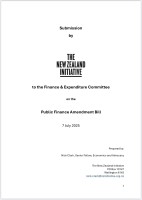The case for regulatory standards
Parliament faces tighter constraints when it wants to spend money than when it wishes to regulate. The Regulatory Standards Bill would set the two on slightly more equal footing. Read more

Parliament faces tighter constraints when it wants to spend money than when it wishes to regulate. The Regulatory Standards Bill would set the two on slightly more equal footing. Read more
In this second episode of their three-part series on New Zealand's housing crisis, Eric Crampton continues the discussion with Stu Donovan and Benno Blaschke, exploring what competitive urban land markets could look like. Building on their previous exploration of how New Zealand's housing became dysfunctional, they now examine the ideal alternative to the current system, detailing how a more responsive urban environment could address the structural issues discussed in Part 1. Read more
Who knew that fixing something that works would become New Zealand’s signature planning move? In 1988, New Zealand boasted 453 special purpose governance entities. Read more
The government's latest Resource Management Act (RMA) consultation promises improvements to a broken system. The proposals for new national directions for infrastructure, the primary sector, and freshwater raise a critical question: are they preparing the ground for a property-rights-based resource management system or merely tinkering at the edges? Read more
The Netherlands has long been Europe’s model of commercial pragmatism. Its business leaders built their fortunes on free trade, open markets, and meticulous efficiency. Read more
This week, Parliament’s Finance and Expenditure Committee is hearing oral submissions on the government’s Regulatory Standards Bill. I support the Bill, most submitters oppose it. Read more
Dr Barbara Oakley talked to Kathryn Ryan on RNZ's Nine to Noon about the critical importance of memory, learning, and cognitive development in an era of artificial intelligence. She discussed her research on declining IQ scores, the challenges of modern educational approaches, and how students can effectively use digital tools while maintaining core cognitive skills. Read more
The way the government went about rolling back 33 pay equity claims lodged under the last government’s Pay Equity legislation was clumsy at best. The changes were made under urgency and applied retrospectively. Read more
A book currently climbing the German bestseller charts caught my attention recently, not least because its title poses a question that seems at once paradoxical and profound. Jan Loffeld’s Wenn nichts fehlt, wo Gott fehlt (“When nothing is missing where God is missing”) examines a growing phenomenon across Western societies that transcends conventional secularisation. Read more

1. INTRODUCTION 1.1 This submission on the Public Finance Amendment Bill is made by The New Zealand Initiative (the Initiative), a Wellington-based think tank supported primarily by major New Zealand businesses. Read more
The New Zealand Initiative mourns the passing of our esteemed Adjunct Senior Fellow, Emeritus Professor Des Gorman, who died peacefully at home on 2 July 2025, surrounded by his family. Des was a towering figure in New Zealand medicine and a passionate advocate for health reform. Read more
In this episode, Eric Crampton talks to Benno Blaschke and Stu Donovan (Senior Fellow at Motu) about the complex history of New Zealand's housing crisis, exploring the first part of a three-part series on housing dysfunction. They delve into the underlying causes of housing unaffordability, exploring how urban planning policies, council incentives, and infrastructure constraints have contributed to limited housing supply in major cities like Auckland. Read more
Future historians may seek to understand why early 21st century New Zealand struggled to get value from its infrastructure spending. They will need to look no further than Auckland's achievement in speed bump construction and subsequent destruction. Read more
Activist organisations have an important place in democracy. Politicians must negotiate public opinion, media narratives and coalition agreements. Read more
Housing and Infrastructure Minister Chris Bishop released his Going for Housing Growth discussion document last month, promising a new paradigm for planning in New Zealand. The proposals are the latest waypoint in a reform journey spanning nearly a decade. Read more